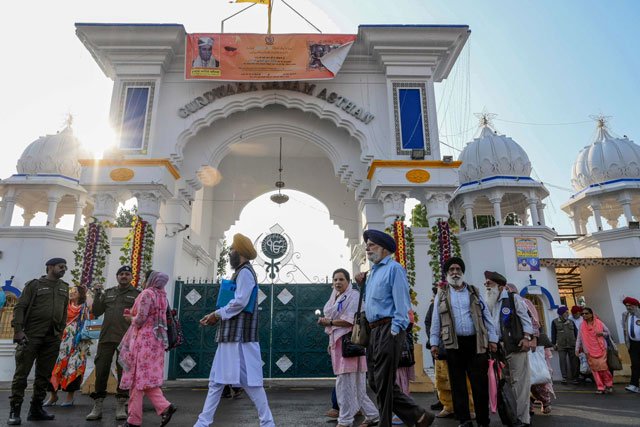
Per sources, the Evacuee Trust Property Board – a governmental body responsible for overseeing educational, charitable or religious trusts left behind by Hindus and Sikhs who migrated to India after partition – said the process will kick start with the restoration of the Shawala Teja Singh Temple in Sialkot, which opened after 70 years.
After that, the board plans to renovate the Panj Tirath Temple in Peshawar, Khyber Pakhtunkhwa – a Hindu religious site which is more than a thousand years old. At the same time, the restoration of the Gurdwara Dera Sahib in Lahore will also take place.
The restoration and decorative work of Sikh and Hindu religious sites in Pakistan have been going on for many years. So far, 14 temples and 20 gurdwaras have been renovated and restored. After the necessary repair, many of the temples now operate regularly and have opened their doors to worshippers.
These include the Krishna Temple in Rawalpindi, Katas Raj Temples in Chakwal, the Krishna Temple in Lahore, Sadhu Bela Temple in Sukkur, the Guru Gurpat Temple in Hyderabad, and the Darya Lal Temple in Karachi. Apart from these, several temples in Sialkot and Sindh’s Dadu District have also been restored.
Speaking to The Express Tribune, Evacuee Trust Property Board’s Deputy Secretary of Shrines Syed Faraz Abbas said that after the lifting of the lockdown, the second phase of the renovation of the Shawala Teja Singh Temple in Sialkot will immediately begin.
“The work had to be delayed because of the coronavirus lockdown, but as soon as things return to normalcy, we will repair the dome of the temple, paint the entire building, and start the flooring work of the courtyard,” he said. “Similarly, the restoration work of the Tirath Temple in Peshawar will be completed and the place will be opened for worship as soon as possible.”
He added that about seven temples of Nankana Sahib including the Janam Asthan, Patti Sahib, Tambo Sahib, Bal Lila, Panja Sahib and Kiara Sahib, have been restored and made functional by the Pakistan Sikh Gurdwara Prabandhak Committee in collaboration with the Evacuee Trust Property Board.
“We have also restored the Gurdwara Sacha Sauda Temple in Farooqabad, Rori Sahib in Eminabad, Dera Sahib in Lahore, Gurdwara Janam Asthan Guru Ram Das, and Gurdwara Bebe Nanaki Ji, among others. All these places of worship are fully functional and open to Sikh devotees,” Abbas said.
According to Pakistan Sikh Gurdwara Prabandhak Committee’s Secretary General Sardar Ameer Singh, Sikh pilgrims visit the gurdwaras regularly as these sites are among the holiest ones for them.
“The most commonly-visited ones include Gurdwara Janam Asthan in Nankana Sahib, Gurdwara Darbar Sahib in Kartarpur, Gurdwara Sacha Sauda in Farooqabad, Gurdwara Rori Sahib in Eminabad, and Gurdwara Dera Sahib in Lahore,” he said.
“Per our records, there were a total of 153 Sikh holy sites in Pakistan. However, after the partition of India in 1947, several gurdwaras had to be closed, and their buildings were either destroyed due to wear and tear or they were used for some other purposes,” Ameer Singh revealed.
“So far, the government of Pakistan has restored 20 gurdwaras, of which 18 are large ones where Sikh pilgrims go for worship.”
The officials of the Evacuee Trust Property Board said that restoration work is under way in several Sikh temples and the government is employing efforts to expedite the work after the end of the lockdown.
1732503274-0/Untitled-design-(43)1732503274-0-405x300.webp)
1732501636-0/Untitled-design-(42)1732501636-0-165x106.webp)

1732498967-0/Outer-Banks--(1)1732498967-0-165x106.webp)
1732086766-0/BeFunky-collage-(74)1732086766-0-165x106.webp)












COMMENTS
Comments are moderated and generally will be posted if they are on-topic and not abusive.
For more information, please see our Comments FAQ